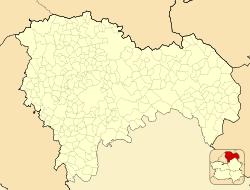You can help expand this article with text translated from the corresponding article in Spanish. (August 2012)Click [show] for important translation instructions.
|
Valdearenas | |
|---|---|
Municipality | |
 | |
| Coordinates: 40°48′40″N2°59′27″W / 40.81111°N 2.99083°W | |
| Country | |
| Autonomous community | Castile-La Mancha |
| Province | Guadalajara |
| Municipality | Valdearenas |
| Government | |
| • Mayor | Tomás Gómez Esteban (PSOE) |
| Area | |
• Total | 15.44 km2 (5.96 sq mi) |
| Elevation | 964 m (3,163 ft) |
| Population (2024-01-01) [1] | |
• Total | 91 |
| • Density | 5.9/km2 (15/sq mi) |
| Postal code | 19196 |
| Website | http://www.valdearenas.es |
Valdearenas is a municipality located in the province of Guadalajara, Castile-La Mancha, Spain.



